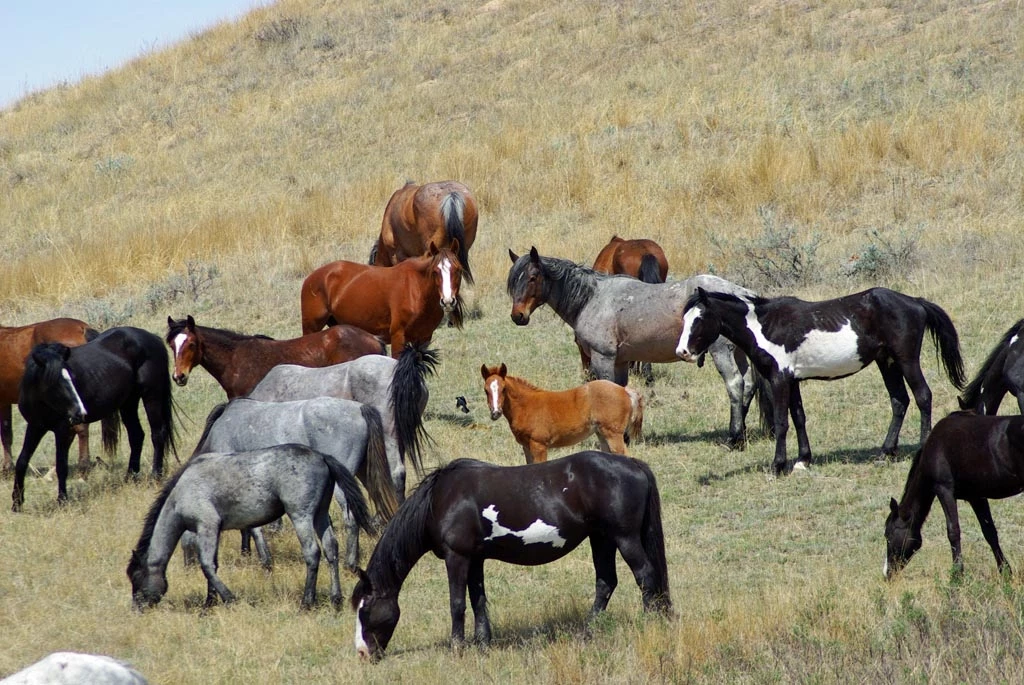Last updated: August 15, 2018
Article
Fertility control produces potential for feral horse management in park units

NPS Photo.
Being a wildlife veterinarian in the National Park Service (NPS) can be a balancing act. As if wildlife management in national parks isn’t hard enough, some species, such as feral horses, hold a special place in the hearts and minds of visitors, but can harm the natural environment. This may complicate the course of action.
Jenny Powers is one such NPS wildlife veterinarian who weighs plant and animal protection with public concerns. Enter a recent research study conducted by Colorado State University, in collaboration with the NPS and USGS, that may have found a useful tool to balance the desire to have feral horses in NPS units with the reality that their presence is often harmful.
The trouble with feral horses
Horses are ingrained in our nation’s history, representing the old West, freedom, and beauty in many people's minds. What many people may not realize, is that, in fact, horses are not native to America. Today’s horses were brought over by European explorers and settlers. While domestic horses have served humans well as pack animals, livestock, and companions, free-ranging feral horses can pose a big threat to the natural environment, especially in national parks.
The presence of feral horses in several park units is a challenge because they exhaust the park’s natural resources with overgrazing, degradation of natural water sources, and out-competing native wildlife as their populations grow and grow. In national parks horses are managed in multiple ways, depending on a variety of social and ecological factors. The NPS seeks to limit the negative effects of horses on valued resources but also provide opportunity to see historic horse herds.
For these reasons, feral horses are a beautiful sight to behold, but a troublesome species to manage in the NPS.
Safe sex for horses, with the help of science
During a 2009 roundup of a feral horses in Theodore Roosevelt National Park, Powers and a team of biologists had the opportunity to treat the herd’s mares (female horses) with a GnRH vaccine (GonaCon-Equine), which affects hormones, controlling reproduction in a wide variety of species.
“There’s a desire for fertility control to be the ‘silver bullet’ answer for many overabundant species,” said Powers. “It’s a way to limit reproduction without having to kill animals, much the same way that we do in ourselves and domestic animals.”
The NPS used to capture horses and sell them at auction. Now partners offer them for adoption. But helicopters are often used in the round-ups, and one crash a few years ago signaled the need for better ways to manage feral horses. The decision to test fertility control methods on feral horses in Theodore Roosevelt National Park was the result of this crash.
“There were two rounds of vaccinations four years apart. After administering the vaccines, the mares were monitored, to check for inflammatory reactions at the site of vaccine and to see if the body condition of treated mares changed, in addition to monitoring reproduction,” said Powers.
Horses have long pregnancies - nearly a full year. The researchers purpose for watching the mare’s body weight was to determine if their overall health improved as a result of not being in a near constant, pregnant and nursing state.
While the research on this piece of the study is currently still ongoing, researchers were able to determine the effectiveness of the contraceptive vaccine. After two vaccinations no foals were born to treated mares and after 3 breeding seasons post re-immunization less than 20% of treated mares are reproducing. What’s more, they tested this vaccine in pregnant mares and no side effects were evident in foals.
Are wildlife birth control ranger programs coming to a park near you?
Not likely. Though the results of the research represent an exciting potential, Powers contends that fertility control is not right for many species.
“Fertility control by its very nature removes a significant component of natural selection,” Powers said. “As NPS managers we are trying to protect and promote processes that support natural selection and ecosystem function to the greatest extent possible.”
In addition, fertility control programs require long-term commitment to treatment, and park biologists must be able to easily access the wildlife you are trying to prevent from reproducing. Both of these logistical measures make these techniques difficult to apply in most wild species, according to Powers.
Of course, this depends on where you go. In species that are not native to the park where they reside, such as feral horses, or in small populations of native wildlife where natural selection may no longer have an impact, fertility control methods may be quite appropriate. The GonaCon-Equine vaccine tested by Powers and the team could alleviate the pressures of overabundant horses in park units such as Theodore Roosevelt National Park, where herds are particularly iconic with the public, but are still a natural resource management challenge. There, fertility control has the capability to rein in these unique species in national parks.
Read more about the findings in the research article here.
